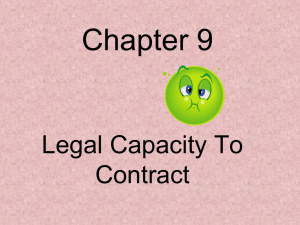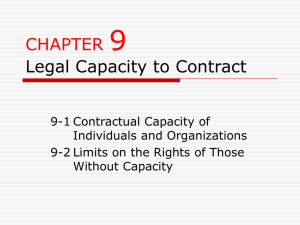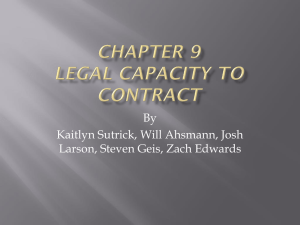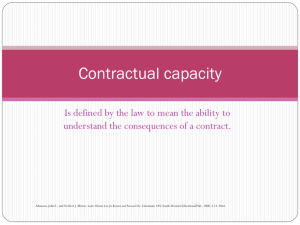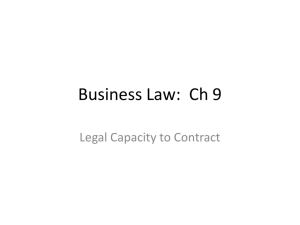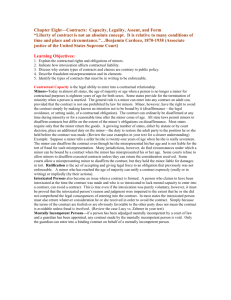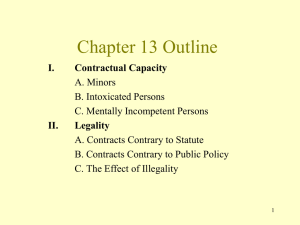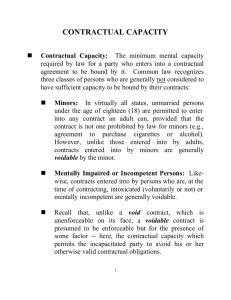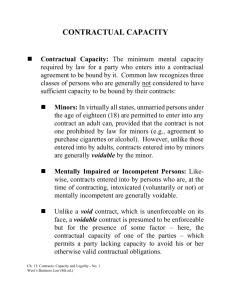chapter9worksheet - businessandpersonallaw
advertisement
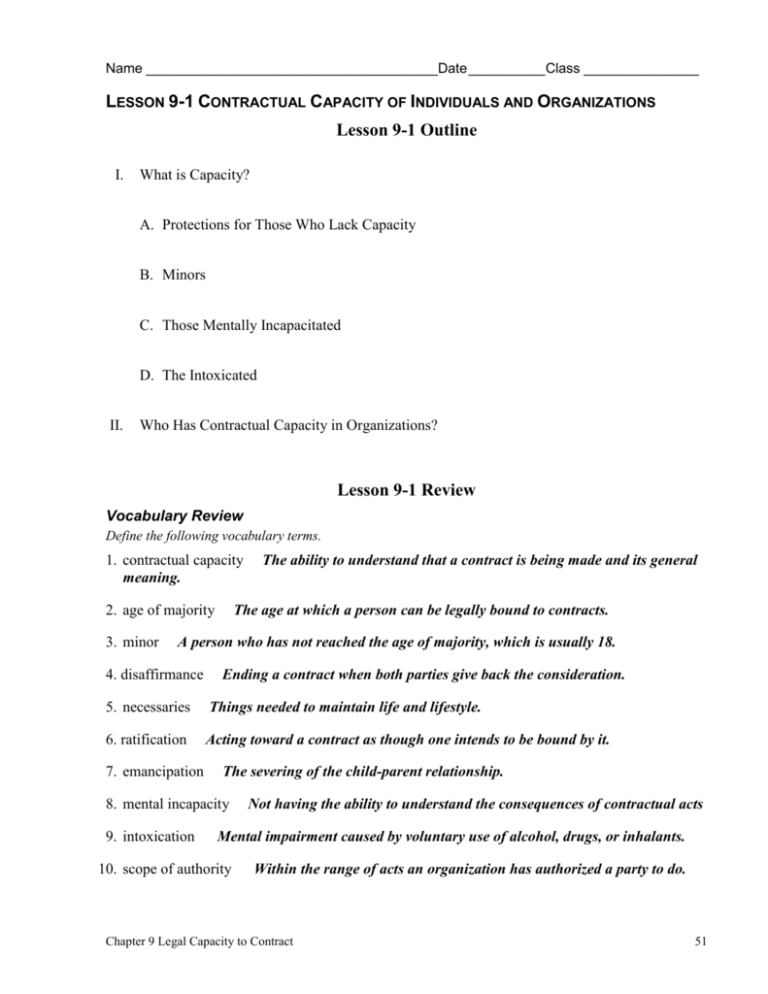
Name ______________________________________Date __________Class _______________ LESSON 9-1 CONTRACTUAL CAPACITY OF INDIVIDUALS AND ORGANIZATIONS Lesson 9-1 Outline I. What is Capacity? A. Protections for Those Who Lack Capacity B. Minors C. Those Mentally Incapacitated D. The Intoxicated II. Who Has Contractual Capacity in Organizations? Lesson 9-1 Review Vocabulary Review Define the following vocabulary terms. 1. contractual capacity meaning. 2. age of majority 3. minor The ability to understand that a contract is being made and its general The age at which a person can be legally bound to contracts. A person who has not reached the age of majority, which is usually 18. 4. disaffirmance Ending a contract when both parties give back the consideration. 5. necessaries Things needed to maintain life and lifestyle. 6. ratification Acting toward a contract as though one intends to be bound by it. 7. emancipation The severing of the child-parent relationship. 8. mental incapacity 9. intoxication Not having the ability to understand the consequences of contractual acts Mental impairment caused by voluntary use of alcohol, drugs, or inhalants. 10. scope of authority Within the range of acts an organization has authorized a party to do. Chapter 9 Legal Capacity to Contract 51 Lesson 9-1 Review (continued) Concept Review 11. Why are some parties protected with special contractual rights? A contract requires an offer, acceptance, mutual assent, and consideration. The law protects certain parties (minors, the mentally incapacitated, and the intoxicated), because they are assumed not to have contractual capacity, the ability to understand that a contract is being made and its general meaning. Therefore, they cannot reasonably assent to a contract. The law assumes that these protected parties cannot protect their self-interests. 12. Why do both vendors and employees of an organization need to be concerned with scope of authority? Scope of authority defines what kinds of contracts an employee or associate is authorized to make for the organization. A vendor should be certain the employee has the authority to make the contract, as it will not be valid if the employee does not have such authority. The employee also should be aware of the scope of authority because the employee may be held personally responsible for the consideration in the contract if he or she makes it outside the scope of authority. Goals Review 13. Identify parties who have contractual capacity. Everyone has contractual capacity except minors, mentally incapacitated persons, and intoxicated persons. 14. What is the role of capacity in organizations? Capacity in an organization refers to what an employee or associate is authorized to contract for in the name of the organization. An employee or associate cannot enter a valid contract for some consideration beyond his or her capacity. Nor can the association be held responsible for such a contract if the employee or associate enters it. 52 Copyright © Thomson/South-Western Publishing Name ______________________________________Date __________Class _______________ LESSON 9-2 LIMITS ON THE RIGHTS OF THOSE WITHOUT CAPACITY Lesson 9-2 Outline I. When Can Disaffirmance Occur and What Must be Done at That tine? A. What Must be Done upon Disaffirmance? 1. Loss of Value 2. Obligations of Party With Capacity II. Contracts That Cannot Be Disaffirmed A. Court-Approved Contracts B. Major Commitments C. Banking Contracts D. Insurance Contracts E. Work-Related Contracts G. Sale of Realty H. Apartment Rental III. Contractual Effect of Misrepresenting Age Chapter 9 Legal Capacity to Contract 53 Lesson 9-2 Review Concept Review 1. When can a person lacking contractual capacity disaffirm a contract for necessaries, goods, or services? A person lacking contractual capacity can disaffirm a contract for necessaries, goods, or services (1) any time while still under the incapacity, or (2) within a reasonable time after attaining capacity. 2. What are some of the contracts that minors can make for goods or services that are not necessaries that cannot be disaffirmed? (1) court-approved contracts (2) major commitments (3) banking contracts (4) insurance contracts (5) work-related contracts (6) sale of realty (7) apartment rental. 3. What are the consequences if a minor lies about his or her age when affirming a contract A minor who lies about his or her age when affirming a contract can still be held liable for torts or delinquent or criminal behavior arising from a contractual transaction. They still have the right to disaffirm their contract, however, the other party to the contract may collect from a minor any damages suffered because of the minor’s fraud even though the minor may be able to disaffirm the contract. Concept Review 4. Identify the time when a contract can or cannot be disaffirmed. Disaffirmance can occur at any time until capacity is gained or regained. It also can occur during a reasonable period of time beyond the attaining of capacity to allow the person in question to review her or his contracts to see which ones to ratify and which to disaffirm. 5. Identify contracts that cannot be disaffirmed. Minors cannot disaffirm court-approved contracts or major commitments. In most states banking, insurance, and work-related contracts cannot be disaffirmed. In some states the sale of realty and apartment rental contracts cannot be disaffirmed. The states also are uniform in disallowing disaffirmance of court-approved contracts and major commitments such as enlisting in the armed services, contracting for education loans, and marriage contracts. 6. What are the consequences of a minor misrepresenting his or her age? A minor who misrepresents age may be liable for a tort of false representation and although still having capacity rights to disaffirm a contract may also be liable for damages in the tort. 54 Copyright © Thomson/South-Western Publishing
